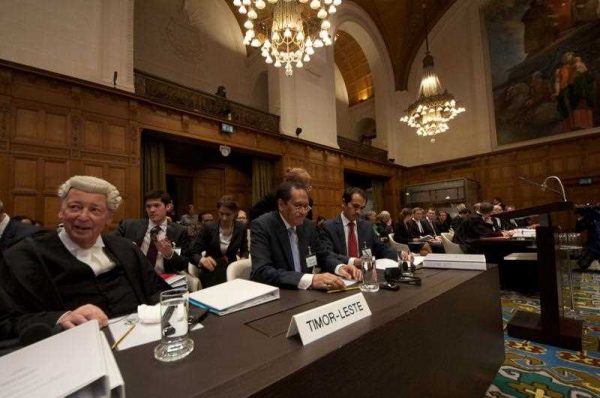The parliamentary motion seeks to suspend the contracts on the basis of ‘force majeure and national interest’, and calls on the executive to investigate the ‘depth of functioning of the sector’, citing ‘legal irregularities … exposing the country to external threats to its sovereignty and … national security’. The motion further declares that foreign professionals have shown a ‘lack of capacity’ and calls on the government to ‘equip Timorese staff of appropriate expertise’. A subsequent government resolution then adopted the measures in the parliamentary motion. While there is no question the judicial sector in Timor-Leste remains weak, the handling of this issue by parliament and the executive raises concerns over perceptions of judicial independence.
Judges, prosecutors and public defenders, mostly from Portuguese-speaking countries, have formed part of Timor-Leste’s judicial system since the restoration of independence in 2002. Others work as judicial advisers in associated bodies like the Anti-Corruption Commission and the Judicial Training Centre. Over time, suitably trained East Timorese have progressively replaced these positions. Some 50 current judicial officers are foreign nationals, including an estimated 12 per cent of judges. International judges are required by law to have five years’ experience and come from a civil law jurisdiction.
While it has been a long-term goal to fully ‘Timorise’ the judicial system, citing particular court decisions as the reason for dismissing judges inevitably raises concerns of government attempts to directly influence judicial outcomes. Not all members of parliament were supportive of the parliamentary motion, with some objections from the opposition party Fretilin, whose spokesperson Estanislau da Silva labelled the motion an ‘interference in the justice system’.
Timor-Leste’s constitution provides guarantees for the separation of powers, and for judicial independence. As in other jurisdictions, judges cannot be dismissed by a simple parliamentary motion. This requires a process of the Superior Council of the Judiciary (SCJ), which has managerial and disciplinary oversight of judicial officers. Such processes are addressed to individual judicial officers accused of misconduct or poor performance. The SCJ comprises the president of the Court of Appeal and members appointed respectively by the president, the government, parliament and the legal profession. This body is charged with regulating the judiciary to minimise the scope for direct government interference.
A previous episode involving the SCJ offers something of a precedent for these developments.
In 2008, a Portuguese judge — then acting president of the Court of Appeal — was stood aside by the SCJ, following his determination that a particular development fund created in the 2008 state budget was unconstitutional. The SCJ terminated the judge’s contract from the date of that decision. The dismissed judge then successfully brought an appeal process to the Court of Appeal, which found the SCJ decision to be ‘manifestly arbitrary and contrary to the law’. Though the judge left the country after a second SCJ ruling, the Court of Appeal — consisting of three Timorese judges — found that all provisions under Timorese law to ensure judicial independence ‘apply necessarily to international judges’. In particular, the Court of Appeal addressed the question of public perceptions noting that ‘the circumstances and the manner in which the decision was taken … appeared in the eyes of the mass media, and was communicated by them, as being motivated by political reasons’.
The present case raises similar issues of perception, and in a somewhat aggravated form, since parliament, rather than the SCJ, has been used as a forum to discipline elements of the judiciary. Even with the best policy intent, using decisions that have frustrated the government as the rationale for judicial dismissal can only be construed as an attack on judicial independence and the rule of law. It is possible that this agenda could be found unconstitutional. Already, the President of the Court of Appeal has advised judicial officers that the resolutions have no legal effect and they should continue to report for work.
There are distinct issues of policy and judicial independence at play here which should be kept separate. The presence of foreign judicial officers is a legacy of state-building in Timor-Leste, and the product of a policy to address a shortage of trained judicial officers. Though this latest move is likely to exacerbate the backlog of court cases, and disrupt legal training, the issue of whether this program continues is a legitimate policy matter for determination by the East Timorese government. Equally, for parliament to express concerns over the general operation of the judicial sector is certainly within its public responsibilities and remit.
But the way in which individual judges’ contracts are terminated inevitably reflects on perceptions of the judicial system as a whole. An alternative way to end the program would be to allow individual contracts to expire as they fall due or retire, and to complete the process of ‘Timorisation’ by a process of natural attrition. This process was already in train, and all indications are that East Timorese judges will stand up for the independence of the judiciary.
Where courts repeatedly reach decisions that governments do not like, it may suggest the need to amend or refine relevant legislation. It was also open to the government to take these decisions to the Court of Appeal, rather than create the perception that judges should ‘toe the line’ or risk losing their positions. The risk is that this course of action could reduce confidence in the independence of the East Timorese legal system, with potential flow-on implications for foreign investment, and for democratic accountability.
Michael Leach is an Associate Professor in Politics and Public Policy at Swinburne University of Technology.


Well if they have had Portuguese lawyers etc , then they asked for the problems. The legal system in Portugal is in a mess and many people in the legal system lazy and incompetent .